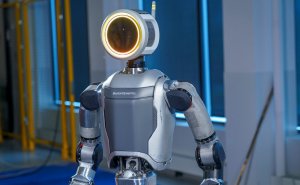How is Dell? We really don’t know, but we need to
![]() Having essentially hit the reset button after going private, Dell is trying to reposition itself as what Michael Dell has called “the world’s largest startup.” Internally, the company is focusing on innovation, increasing competition and cutting staff, supposedly a necessary condition for accomplishing its other goals.
Having essentially hit the reset button after going private, Dell is trying to reposition itself as what Michael Dell has called “the world’s largest startup.” Internally, the company is focusing on innovation, increasing competition and cutting staff, supposedly a necessary condition for accomplishing its other goals.
Externally, Dell is emphasizing its B-t0-B roots, including advertisements linking Dell to other startups, including DropBox, Whole Foods, Salesforce and others.
“In spirit [going private] is a good thing for Dell, they have the option to now invest for the longer term out of the public eye and how well they do that is critical,” David Johnson, principal analyst, infrastructure and operations at Forrester Research told Advertising Age.
Losing, then rediscovering its way
.
Michael Dell has identified one goal of privatizing the company he founded as creating rapid growth, but first there is the pesky problem of perhaps 15,000 excess workers, now being separated from a company that formerly had 110,000 worldwide employees.
Dell, the company, went private last fall — at a cost of $24.9 billion. The company had lost its way and was unable to find a better path with the wolves of Wall Street breathing down its neck.
That’s my impression, anyway, of a $56 billion company that was dead in the water, despite doing a pretty good job of treading water for most of the last decade.
The company used to be a leader, but at some point seemed to stop even trying, at least in its most visible businesses. Dell provided mostly solid products and services, but nothing that would cause one to exclaim, paraphrasing the commercial, “Dude, I’ve got a Dell!”
It ain’t over!
.
Michael Dell’s job, now that he heads the third-largest privately held company in America is making it interesting and exciting once again. (The #1 is Cargill and #2 is Koch Industries, BTW.)
Doing this without the expenses associated with being a public company is reportedly enough to pay the interest on the money borrowed to float the buyout deal. The loss of public company aggravation and outsider second-guessing? Priceless.
Dell, who I have known peripherally since the days of PC’s Limited, should not be underestimated. He is that rarest of rare entrepreneurs who still runs (and now owns!) his company three decades after its founding.
But can he essentially reboot a $50 billion company? After all, he was there, too, when the company lost its way. Is the 2014 Michael Dell different from the Dell of, say, 2010? Of 2000? Can he find his way back to the Michael Dell of 1984, when the company was founded in a dorm room and quickly shot to greatness?
We won’t know for a while and Dell’s company isn’t likely to provide many details of its journey. Dell PR, for example, did not return a telephone call seeking information for this story.
Lacking the force of compelling law, Dell isn’t likely to go into details about its financials and if it does might be expected to cherry-pick the numbers it provides customers and the public. Dell still maintains an investor relations page and offers institutional investors, who will trade Dell’s credit obligations, some financial information.
Otherwise, Dell’s numbers are none of our business. Or are they?
A “need to know” basis
.
As a customer, I like reassurance the companies that get my money are stable and can be counted upon. My bet is Dell is likely to spin-off or even close some parts of the existing business in the months ahead. In a public company, analysts can often see these things coming sometimes years in advance. Customers can be prepared.
At the privately-held Dell, a semi-profitable, failing or simply no longer interesting business could be sold, spun or closed in almost the wink of an eye. My experience is customers often don’t fare well in such a circumstance.
And will it be hard to Dell to hire rocket scientists after a huge layoff? Again, an unknown financial situation could play into the concerns on would-be Dellians.
Somehow, Michael Dell needs to bring the collective “us” perhaps closer to Dell than we’ve been in decades. We need to see a growing company, making smart choices and bringing the exciting to the excitable.
It’s been a long time since Dell has routinely done that, but Michael Dell now has a special interest. Previously, the company’s troubles could be blamed on any number of causes and while that is still true, today the solution, like the company, is owned by single man.
Don’t sell Michael Dell short. And give him some time. I am expecting big things.
photo: Dell’s Official Flickr Page via photopin cc
A message from John Furrier, co-founder of SiliconANGLE:
Your vote of support is important to us and it helps us keep the content FREE.
One click below supports our mission to provide free, deep, and relevant content.
Join our community on YouTube
Join the community that includes more than 15,000 #CubeAlumni experts, including Amazon.com CEO Andy Jassy, Dell Technologies founder and CEO Michael Dell, Intel CEO Pat Gelsinger, and many more luminaries and experts.
THANK YOU













